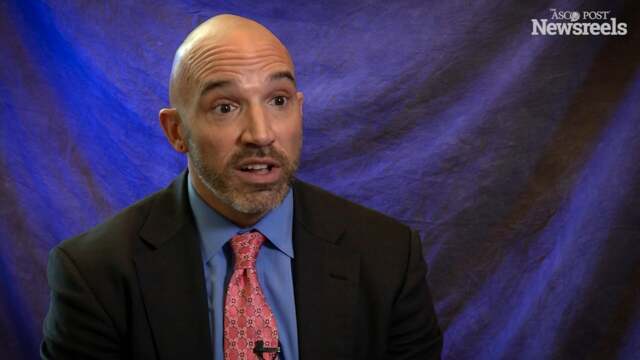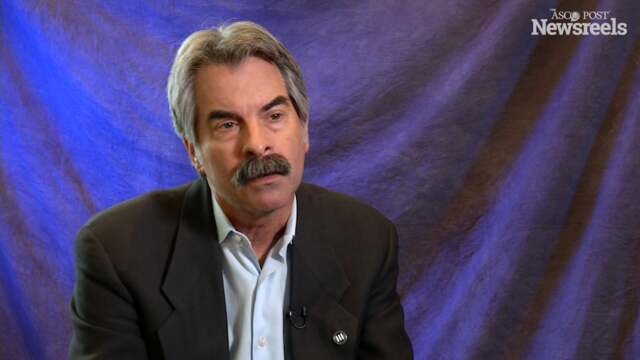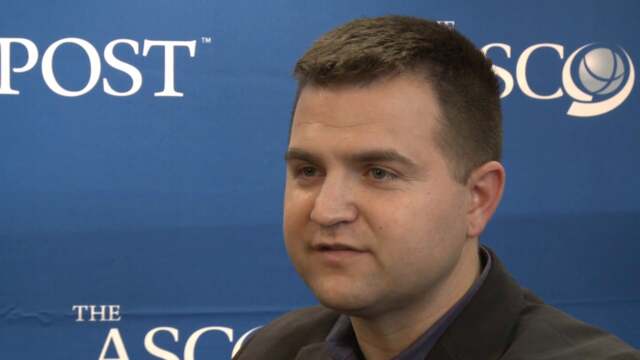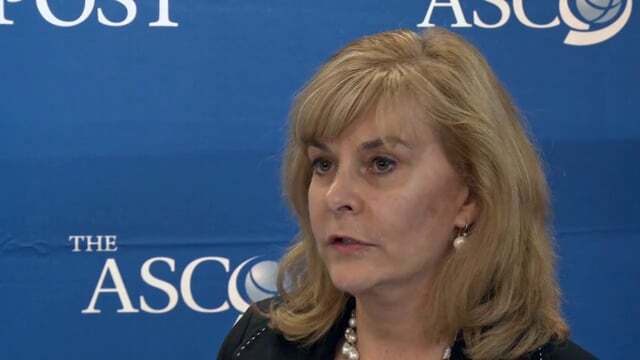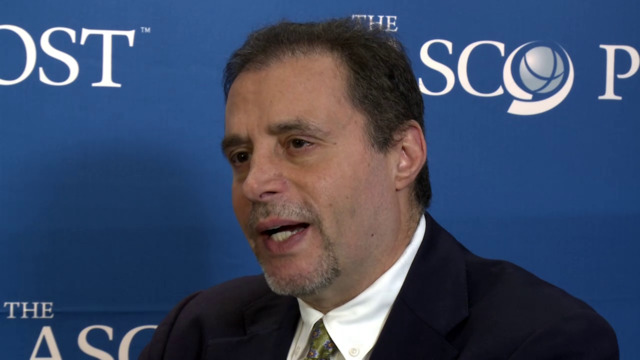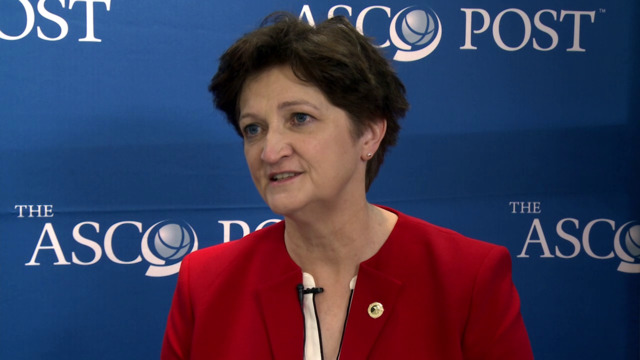Sagar Lonial, MD, and Andrew Zelenetz, MD, PhD, on MCL, DLBCL, CLL: How Much Rituximab Is Enough?
Sagar Lonial, MD, of Emory University School of Medicine, and Andrew D. Zelenetz, MD, PhD, of Memorial Sloan Kettering Cancer Center, discuss newly reported findings on rituximab maintenance therapy in hematologic malignancies (Abstracts 7503, 7504, and 7505).
Seattle Children’s Reports Promising Early Results With Immunotherapy in Relapsed ALL
Seattle Children’s announced that 39 of 42 patients treated in a phase I clinical trial using genetically reprogrammed T cells to treat relapsed or refractory acute lymphoblastic leukemia (ALL) have achieved complete remission, showing no detectable leukemia cells. Phase II of this trial, known as...
ASCO 2016: Patients With Cancer With ACA Policies Swiftly Reach Out-of-Pocket Caps
Duke Cancer Institute researchers have found that a hypothetical leukemia patient buying the life-extending drug therapy for his condition would reach his annual out-of-pocket maximum in a month on most of the bronze policies and half of the silver policies offered through the Affordable Care Act...
First-Line Fludarabine, Cyclophosphamide, and Rituximab vs Bendamustine/Rituximab in Advanced CLL
In a European phase III noninferiority trial reported in The Lancet Oncology, Eichhorst et al found that progression-free survival was better with standard first-line fludarabine/cyclophosphamide/rituximab vs bendamustine/rituximab in fit patients with advanced chronic lymphocytic leukemia (CLL)...
5-Year Results of DASISION Trial of Dasatinib vs Imatinib in CML
As reported in the Journal of Clinical Oncology by Cortes et al, the final 5-year results of the DASISION trial support the safety and efficacy of dasatinib (Sprycel) as first-line treatment in patients with chronic myeloid leukemia (CML) in chronic phase. Initial results in the trial led to...
International Prognostic Index for Patients With Chronic Lymphocytic Leukemia
The International Chronic Lymphocytic Leukemia–International Prognostic Index (CLL-IPI) working group has developed an IPI for patients with chronic lymphocytic leukemia based on a meta-analysis of individual patient data, as reported in The Lancet Oncology. Study Details The meta-analysis...
Venetoclax for Previously Treated Chronic Lymphocytic Leukemia With 17p Deletion
On April 11, 2016, venetoclax (Venclexta) was approved for treatment of patients with chronic lymphocytic leukemia (CLL) with 17p deletion, as detected by a U.S. Food and Drug Administration (FDA)-approved test, who have received at least one prior therapy.1,2 The accelerated approval was based...
Recent Reports on Treatment for Leukemias, Sinusoidal Obstruction Syndrome, and Graft-vs-Host Disease
In this installment of Hematology Expert Review, I will summarize five studies from the recent literature addressing important questions about leukemias and their treatment, anticoagulant therapy with the new agent defibrotide (Defitelio), and the use of antilymphocyte globulin to prevent chronic...
The Arrival of Generic Imatinib Into the U.S. Market: An Educational Event
Imatinib mesylate (Gleevec), a Bcr-Abl tyrosine kinase inhibitor, is approved therapy for chronic myeloid leukemia (CML) in the United States. Imatinib is a miraculous drug that results in a normal functional lifespan in most patients with CML who can afford and comply with the treatment and who ...
Venetoclax Produces High Response Rate in Relapsed or Refractory CLL With 17p Deletion
In a phase II study reported in The Lancet Oncology, Stilgenbauer et al found that the BCL2 inhibitor venetoclax (Venclexta) produced a high response rate in patients with relapsed or refractory chronic lymphocytic leukemia (CLL) with the 17p deletion (del [17p]). The study supported the recent...
Risk Factors for Acute Pancreatitis in Children/Young Adults With Acute Lymphoblastic Leukemia
In a study reported in the Journal of Clinical Oncology, Liu et al found that Native American ancestry, older age, higher cumulative dose of asparaginase, and a rare variant of the CPA2 gene increased risk for pancreatitis in children/young adults with acute lymphoblastic leukemia (ALL). Study...
Benefit of Dexamethasone and High-Dose Methotrexate in Children/Young Adults With High-Risk B-Acute Lymphoblastic Leukemia
As reported by Larsen et al in the Journal of Clinical Oncology, final data from the Children’s Oncology Group (COG) AALL0232 trial indicate that the event-free survival benefit of high-dose methotrexate was maintained in children/young adults with high-risk B-acute lymphoblastic leukemia....
FDA Grants sBLA for Blinatumomab in Pediatric Patients With Ph–Negative Relapsed/Refractory B-Cell Precursor ALL
Amgen announced on May 3 that the U.S. Food and Drug Administration (FDA) has accepted for priority review the supplemental Biologics License Application (sBLA) for blinatumomab (Blincyto) to include new data supporting the treatment of pediatric and adolescent patients with Philadelphia...
Donor Epstein-Barr Virus Status Affects Risk for Graft-vs-Host Disease but Not Survival in Acute Leukemia After HSCT
Positive donor Epstein-Barr virus (EBV) serostatus increases the risk for graft-vs-host disease but does not affect relapse-free or overall survival among patients with acute leukemia receiving allogeneic hematopoietic stem cell transplantation (allo-HSCT), according to a study from the Acute...
Potential Biomarker for Carfilzomib Activity in CLL
Carfilzomib (Kyprolis) is active in B-cell neoplasms but exhibits heterogeneous activity in chronic lymphocytic leukemia (CLL) samples. As reported in Clinical Cancer Research, Lamothe and colleagues examined the mechanism by which carfilzomib induces CLL cell death. In studies using CLL patient...
City of Hope Awarded NCI Research Grant for Potential Acute Myeloid Leukemia Drug
A City of Hope research team led by Steven T. Rosen, MD, City of Hope’s Provost and Chief Scientific Officer, has been awarded a $2.3 million Research Project Grant (R01) from the National Cancer Institute (NCI) to fund studies associated with a phase I/II clinical trial in relapsed/refractory...
FDA Approves Venetoclax for Chronic Lymphocytic Leukemia With 17p Deletion
On April 11, 2016, the U.S. Food and Drug Administration (FDA) approved venetoclax (Venclexta) for the treatment of patients with chronic lymphocytic leukemia (CLL) with 17p deletion, as detected by an FDA-approved test, who have received at least one prior therapy. Venetoclax is the first...
Selected Abstracts From 2015 ASH Annual Meeting: Part 4
Here is the final installment of selected abstracts from the proceedings of the 2015 American Society of Hematology (ASH) Annual Meeting and Exposition, focusing on Hodgkin lymphoma, follicular lymphoma, diffuse large B-cell lymphoma, and chronic lymphocytic leukemia. For other selected abstracts...
Jeffrey Jones, MD, MPH, on Chronic Lymphocytic Leukemia: Optimizing Treatment With New Agents
Jeffrey Jones, MD, MPH, of the Ohio State University Comprehensive Cancer Center, discusses the use of small molecule inhibitors in developing an individualized treatment plan for patients with CLL.
Jerald Radich, MD, on Chronic Myeloid Leukemia: Managing Advanced-Phase Disease
Jerald P. Radich, MD, of the Fred Hutchinson Cancer Research Center, discusses ways to prevent advanced-phase chronic myeloid leukemia through adherence to prescribed treatment and routine monitoring of disease burden.
Minimal Residual Disease in AML: Worth Looking?
As summarized in this issue of The ASCO Post, Ivey and colleagues demonstrated that assessing for NPM1-mutated gene transcripts by reverse-transcriptase quantitative polymerase chain reaction assay is a feasible approach for measuring minimal residual disease after acute myeloid leukemia (AML)...
Minimal Residual Disease Identified by NPM1 Mutation Is a Powerful Marker for Poorer Outcome in Standard-Risk AML
In a study reported in The New England Journal of Medicine, Adam Ivey, MSc, from Guy’s Hospital, London, and colleagues found that a leukemia-specific marker consisting of mutation in the gene encoding nucleophosmin (NPM1) can be used to identify minimal residual disease in peripheral blood in...
Two Types of Asparaginase Compared in Newly Diagnosed Childhood Acute Lymphoblastic Leukemia
Intravenous pegylated (PEG) Escherichia coli (E coli) asparaginase was associated with similar toxicity and efficacy compared with intramuscular native E coli L-asparaginase in children with newly diagnosed acute lymphoblastic leukemia, according to the results of a phase III trial (DFCI 05-001).1 ...
Chronic Lymphocytic Leukemia: The Golden Drug Only for Golden Agers?
As reviewed in this issue of The ASCO Post, Burger and colleagues recently reported findings of the RESONATE-2 trial of ibrutinib (Imbruvica) vs chlorambucil (Leukeran) as initial therapy for elderly patients with chronic lymphocytic leukemia (CLL).1 The study met its primary endpoint of...
First-Line Ibrutinib Improves Progression-Free and Overall Survival vs Chlorambucil in Older Patients With Chronic Lymphocytic Leukemia
As reported in The New England Journal of Medicine and at the 2015 American Society of Hematology Annual Meeting, Jan A. Burger, MD, PhD, and colleagues found that first-line treatment with the oral Bruton’s tyrosine kinase inhibitor ibrutinib (Imbruvica) improved progression-free and overall...
Specific Form of CYP3A7 Gene Associated With Poor Outcomes for Patients With Several Cancer Types
Among patients with breast cancer, lung cancer, or chronic lymphocytic leukemia (CLL), those who had a specific form of the CYP3A7 gene (CYP3A7*1C) had worse outcomes compared with those who did not have CYP3A7*1C. This may be related to how the patients metabolize the therapeutics used to treat...
Increasing the Dose of Obinutuzumab Monotherapy Raised the Response Rate
A randomized phase II study in symptomatic, untreated patients with chronic lymphocytic leukemia (CLL) found an increased overall response rate with obinutuzumab (Gazyva) at a 2,000 mg vs 1,000 dose. In addition, the “data demonstrate that obinutuzumab produces a higher response rate in...
Adding Targeted Therapy to Chemoimmunotherapy in Patients With Chronic Lymphocytic Leukemia: Questions as to Optimal Strategy Remain
The HELIOS study is an international phase III trial of bendamustine (Treanda) plus rituximab (Rituxan) in combination with ibrutinib (Imbruvica) vs placebo in patients with previously treated chronic lymphocytic leukemia. As reported by Chanan-Khan in The Lancet Oncology1 and reviewed in this...
Children With Leukemia From High-Poverty Areas More Likely to Suffer Early Relapse
Among children with acute lymphoblastic leukemia (ALL), the most common pediatric cancer, those who live in high-poverty areas are substantially more likely to suffer early relapse than other patients, despite having received the same treatment, according to new research from Dana-Farber/Boston...
Minimal Residual Disease Identified by NPM1 Mutation May Be Prognostic Marker for Poorer Outcome in Standard-Risk AML
In a study reported in The New England Journal of Medicine, Ivey et al found that a leukemia-specific marker consisting of a mutation in the gene encoding nucleophosmin (NPM1) can be used to identify minimal residual disease in peripheral blood in standard-risk acute myeloid leukemia (AML), with...
Ofatumumab for Extended Treatment of Patients With Recurrent or Progressive Chronic Lymphocytic Leukemia
On January 19, 2016, ofatumumab (Arzerra) was approved for extended treatment of patients in complete or partial response after at least two lines of therapy for recurrent or progressive chronic lymphocytic leukemia (CLL).1,2 Ofatumumab was previously approved for treatment of untreated patients...
Inherited Genetic Variations That Lead to Severe Drug Toxicity in Pediatric Leukemia Discovered
An international research team has determined how inherited gene variations lead to severe drug toxicity that may threaten chances for a cure in children with leukemia. St. Jude Children’s Research Hospital scientists led the study, results of which set the stage to expand the use of a...
Younger T Cells May Improve Immunotherapy for Pediatric Cancer
Pediatric oncologists from The Children’s Hospital of Philadelphia (CHOP) have investigated techniques to improve and broaden a novel personalized cell therapy to treat children with cancer. The researchers say that a patient’s outcome may be improved if clinicians select specific...
Reduction in Late Mortality in Childhood Cancer Survivors in the Childhood Cancer Survivor Study Cohort
In a study reported in The New England Journal of Medicine, Armstrong et al found that late mortality decreased over time among 5-year survivors of childhood cancer in the Childhood Cancer Survivor Study cohort. The reduction is consistent with efforts during recent decades to modify treatment with ...
FDA Approves Ofatumumab for Patients With Chronic Lymphocytic Leukemia in Complete or Partial Response
The U.S. Food and Drug Administration (FDA) has approved ofatumumab (Arzerra), a CD20-directed cytolytic monoclonal antibody, for extended treatment of patients who are in complete or partial response after at least two lines of therapy for recurrent or progressive chronic lymphocytic leukemia...
New Assay Detects Persistent Disease in Leukemia Patients Thought to Be in Remission
The outcomes of chronic myeloid leukemia (CML) have dramatically improved as the result of tyrosine kinase inhibitor treatment. Use of a tyrosine kinase inhibitor regimen can lower the blood CML biomarker to levels imperceptible by current detection methods. For patients in “molecular...
Bone Loss Associated With Leukemia Therapy Occurs Sooner Than Previously Thought
Investigators at Children’s Hospital Los Angeles (CHLA) have found that significant bone loss occurs during the first month of chemotherapy for acute lymphoblastic leukemia (ALL), which is far earlier than previously assumed. Results of the study were published by Orgel et al in the...
Increased Breast Cancer Risk Reported in Childhood Sarcoma and Leukemia Survivors With No History of Chest Radiotherapy
In an analysis of the Childhood Cancer Survivor Study reported in the Journal of Clinical Oncology, Henderson et al found that childhood survivors of sarcoma and leukemia with no history of chest radiotherapy were at an increased risk of breast cancer. Increased Risk The study included data from...
Matthew Lunning, DO, on Ublituximab Plus TGR-1202 in Lymphoma
Matthew Lunning, DO, of the University of Nebraska Medical Center, on abstract 801, “Ublituximab, a Novel Glycoengineered Anti-CD20 Monoclonal Antibody, in Combination with TGR-1202, a Next-Generation Once Daily PI3kδ Inhibitor, Demonstrates Activity in Heavily Pretreated and High-Risk Chronic Lymphocytic Leukemia and B-Cell Lymphoma.”
Julie M. Vose, MD, MBA, FASCO, on Ublituximab Plus TGR-1202 in Lymphoma
Julie M. Vose, MD, MBA, FASCO, of the University of Nebraska Medical Center, offers her thoughts on abstract 801, “Ublituximab, a Novel Glycoengineered Anti-CD20 Monoclonal Antibody, in Combination With TGR-1202, a Next-Generation Once-Daily PI3kδ Inhibitor, Demonstrates Activity in Heavily Pretreated and High-Risk Chronic Lymphocytic Leukemia and B-Cell Lymphoma,” presented by Matthew A. Lunning, DO.
Hagop Kantarjian, MD, on CAR T Cells in Relapsed/Refractory ALL
Hagop Kantarjian, MD, of The University of Texas MD Anderson Cancer Center, offers his thoughts on abstract 380, “T Cells Engineered with a Chimeric Antigen Receptor (CAR)-Targeting CD19 (CTL019) Have Long Term Persistence and Induce Durable Remissions in Children With Relapsed, Refractory ALL,” presented by Stephan A. Grupp, MD, PhD; abstract 381, “Intent-to-Treat Results of a Phase I Trial of CD19 Chimeric Antigen Receptor Engineered T Cells Using a Consistent Treatment Regimen Reveals a 67% Complete Response Rate in Relapsed, Refractory Acute Lymphoblastic Leukemia,” presented by Daniel W. Lee III, MD; and abstract 382, “CD19-Targeted 19-28z CAR Modified Autologous T Cells Induce High Rates of Complete Remission and Durable Responses in Adult Patients With Relapsed, Refractory B-Cell ALL,” presented by Jae H. Park, MD.
Hagop Kantarjian, MD, on Inotuzumab Ozogamicin Plus Low-Intensity Chemotherapy in ALL
Hagop Kantarjian, MD, of The University of Texas MD Anderson Cancer Center, offers his thoughts on abstract 794, “Inotuzumab Ozogamicin in Combination With Low-Intensity Chemotherapy (Mini-Hyper-CVD) as Front-Line Therapy for Older Patients (≥ 60 years) With Acute Lymphoblastic Leukemia,” presented by Elias Jabbour, MD.
Alan F. List, MD, on Sotatercept in Lower-Risk Myelodysplastic Syndromes
Alan F. List, MD, of Moffitt Cancer Center, offers his thoughts on abstract 3251, “An Open-Label, Phase II, Dose-Finding Study of Sotatercept (ACE-011) in Patients With Low or Intermediate-1–Risk Myelodysplastic Syndromes or Nonproliferative Chronic Myelomonocytic Leukemia and Anemia Requiring Transfusion,” presented by Rami S. Komrokji, MD.
Hagop Kantarjian, MD, on Blinatumomab in Precursor B-Cell ALL
Hagop Kantarjian, MD, of The University of Texas MD Anderson Cancer Center, offers his thoughts on abstract 379, “BLAST: A Confirmatory, Single-Arm, Phase II Study of Blinatumomab, a Bispecific T-Cell Engager (BiTE) Antibody Construct, in Patients With Minimal Residual Disease B-Precursor Acute Lymphoblastic Leukemia,” and abstract 3704, “An Evaluation of Molecular Response in a Phase II Open-Label, Multicenter Confirmatory Study in Patients With Relapsed/Refractory B-Precursor Acute Lymphoblastic Leukemia Receiving Treatment With the BiTE Antibody Construct Blinatumomab,” presented by Nicola Gökbuget, MD.
Hagop Kantarjian, MD, on Treating Philadelphia Chromosome–Positive ALL
Hagop Kantarjian, MD, of The University of Texas MD Anderson Cancer Center, offers his thoughts on abstract 797, “First Results of the Multicenter Total Therapy Gimema LAL 1509 Protocol for De Novo Adult Philadelphia Chromosome–Positive Acute Lymphoblastic Leukemia Patients,” presented by Sabina Chiaretti, MD, PhD, and abstract 798, “Nilotinib and Chemotherapy for First-Line Treatment in Elderly Patients with De Novo Philadelphia Chromosome/BCR-ABL1–Positive Acute Lymphoblastic Leukemia (ALL): A Trial of the European Working Group for Adult ALL (EWALL-PH-02),” presented by Oliver G. Ottman, MD.
Linda J. Burns, MD, on CAR T-Cell Therapy in ALL
2014 ASH President Linda J. Burns, MD, of the University of Minnesota, offers her thoughts on abstract 380, “T Cells Engineered With a Chimeric Antigen Receptor (CAR) Targeting CD19 (CTL019) Have Long-Term Persistence and Induce Durable Remissions in Children with Relapsed, Refractory ALL,” presented by Stephan A. Grupp, MD, PhD. Time: 1:26
Linda J. Burns, MD, on the BLAST Study
2014 ASH President Linda J. Burns, MD, of the University of Minnesota, offers her thoughts on abstract 379, “BLAST: A Confirmatory, Single-Arm, Phase II Study of Blinatumomab, a Bispecific T-Cell Engager (BiTE) Antibody Construct, in Patients with Minimal Residual Disease B-Precursor Acute Lymphoblastic Leukemia (ALL),” presented by Nicola Gökbuget, MD. Time: 1:11
Richard M. Stone, MD, on the UK NCRI AML17 Trial
Richard M. Stone, MD, of Dana-Farber Cancer Institute, offers his thoughts on abstract 7, “A Randomized Comparison of Daunorubicin 90 mg/m2 vs 60 mg/m2 in AML Induction: Results From the UK NCRI AML17 Trial in 1206 Patients,” presented by Alan K. Burnett, MD. Time: 1:29
Richard M. Stone, MD, on the SAL-SORAML Trial
Richard M. Stone, MD, of Dana-Farber Cancer Institute, offers his thoughts on abstract 6, "Sorafenib vs Placebo in Addition to Standard Therapy in Younger Patients With Newly Diagnosed Acute Myeloid Leukemia: Results from 267 Patients Treated in the Randomized Placebo-Controlled SAL-Soraml Trial," presented by Christoph Röllig, MD.
James O. Armitage, MD, FACP, FRCP, and Richard M. Stone, MD, on Clinical Trial Results for AML, MDS, and CMML Treatment
James O. Armitage, MD, FACP, FRCP, of the University of Nebraska Medical Center, and Richard M. Stone, MD of the Dana-Farber Cancer Institute, discuss three clinical trials: different doses of daunorubicin for AML; comparing azacitidine plus lenolidomide to vorinostat vs azacitidine monotherapy in MDS and CMML; and sorafenib vs placebo in addition to standard treatment for AML.

